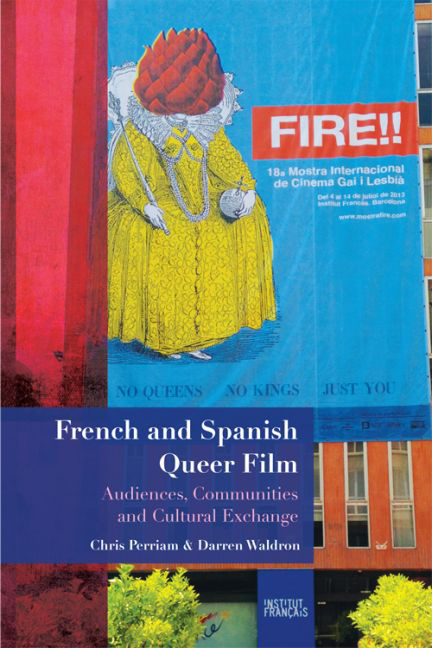Book contents
- Frontmatter
- Contents
- List of Figures
- Acknowledgements
- Introduction
- 1 Cultural Crossovers
- 2 LGBTQ Film Festivals and their Audiences
- 3 LGBQ Themes and Responses
- 4 Trans Issues
- 5 Audiences and Critics: Dialogue and Disagreement
- Conclusion
- Appendix I: Standard Questions for Respondents
- Appendix II: Project Web Page
- Filmography
- References
- Index
Conclusion
Published online by Cambridge University Press: 12 September 2017
- Frontmatter
- Contents
- List of Figures
- Acknowledgements
- Introduction
- 1 Cultural Crossovers
- 2 LGBTQ Film Festivals and their Audiences
- 3 LGBQ Themes and Responses
- 4 Trans Issues
- 5 Audiences and Critics: Dialogue and Disagreement
- Conclusion
- Appendix I: Standard Questions for Respondents
- Appendix II: Project Web Page
- Filmography
- References
- Index
Summary
In this book we have been tracing cinematically mediated, cross-cultural flows and exchange of tastes, opinions, experiences, desires and values between France and Spain and, as a space of reception, Britain. Through our encounters with events and audiences (including the responses of 440 individuals), we have been asking how LGBTQ experiences and communities are inflected by divergences and commonalities mobilised by certain films and their reception. The various encounters between audience and film, between comment and image, and, indeed, present and past, have revealed some specific ways in which tastes, values, desires and fantasies translate between LGBTQ communities in three wide geographical locations. They have shown how thematic preoccupations of a social or political nature connect across languages through films which either were programmed at festivals and in special screenings or that we separately identified as being perceived as key interventions in terms of their tone, their attack or their structuring of issues. By looking through an LGBTQ lens at what France means for Spain and vice versa, and how certain viewers from Britain themselves apprehend or embrace those meanings, we have tried to forge new articulations between film audience research and our knowledge of sexuality in transnational contexts. This has been facilitated by the emerging range of different films covering varied issues and subject positions. In particular, the major themes that run through the responses – love and relationships, ageing, what is or might be living as a lesbian, gay, bisexual, trans or queer Catalan, citizen of France or Spanish subject – have shaped the discussion. The responses we gathered, as well as being concerned, often in self-questioning ways, with individual identity – like Antonio responding to Eastern Boys on the basis of his own particular life or like the very many respondents who were careful to state that they identified with some but not all aspects of a given character or situation experience – have expanded and nuanced the idea of ‘sense of community’. We have been able to explore how respondents in the particular circumstances of their viewing of the films (at festivals, at focus groups, at home, abroad, online) themselves configure such notions as belonging, connection, shared history, shared experience, shared values (and, of course, identification).
- Type
- Chapter
- Information
- French and Spanish Queer FilmAudiences, Communities and Cultural Exchange, pp. 160 - 165Publisher: Edinburgh University PressPrint publication year: 2016



